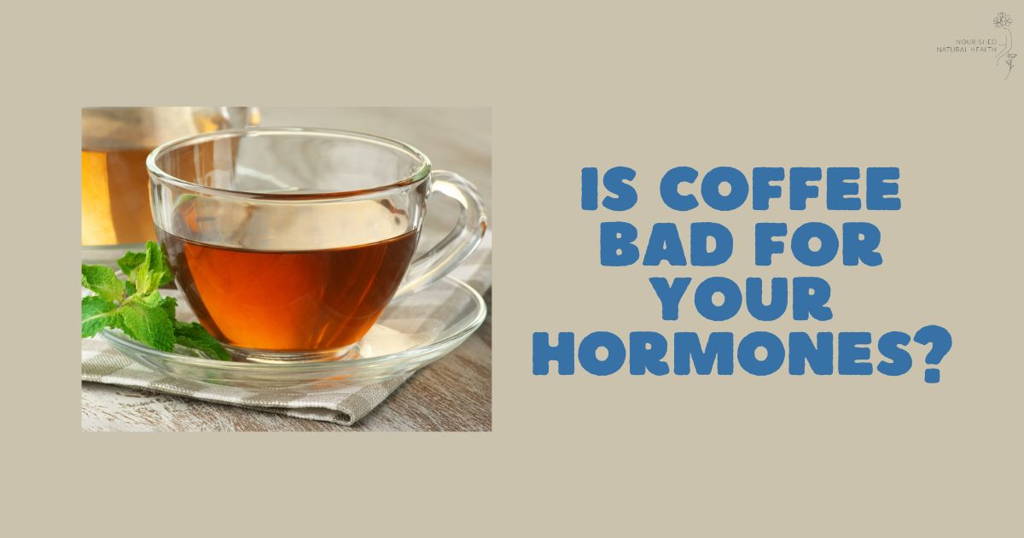
Is Coffee Bad For Your Hormones?
It's seems to be a daily occurrence that I hear people agonizing over how much coffee they are drinking, or complaining about withdrawals when they try to go without it.
We so often hear that we should give up coffee to support our health, but is this really the case?
We all metabolize caffeine very differently, and can handle varying amounts of coffee.
Read on to determine what type of caffeine metabolizer you are and whether or not coffee is good for your body.
Firstly, assess how you metabolise caffeine:
As a Clinical Nutritionist, I often ask clients to give up coffee for small periods of time (usually around two weeks), to see how their body responds.
Some of my clients find that they experience immediate withdrawal symptoms like severe headaches, migraines and low energy.
Others are surprised to find they don’t feel any different and their energy levels remain the same.
Many people find they are less anxious and can sleep better for this period of time.
Based on these reactions, we can usually introduce coffee again slowly and monitor the way the body responds.
Why do we all have such different responses to the same amount of caffeine?
It’s all to do with our liver metabolism.
Caffeine is metabolised via a specific pathway in our liver.
In some people, this pathway functions extremely well and can clear caffeine quickly and easily.
In others, this pathway works a little slower and can cause a build-up of the metabolites as they wait to be broken down.
This explains why some peopleexperience anxiety, a racing heart and difficulties sleeping long after consuming caffeine, even at small doses.
How do you find out if you are a slow metaboliser of coffee?
Take a break for 2 weeks and monitor your response. If your anxiety or sleep issues do not decrease, there is likely another cause.
The next step is to examine why you are choosing coffee:
Taking a two week break from coffee also allows you to assess the reasons you are choosing this drink in the first place:
Is it because you suffer from chronically low energy and need coffee to get you going in the morning or keep you awake in the afternoon?
If this is the case, you may need to assess your sleep, diet and lifestyle to determine why you aren’t able to produce enough energy.
This may mean working on your blood sugar stabilisation, having more regular meals or developing better sleep patterns. (These are all great areas to work on with a Clinical Nutritionist)
Is it because going to buy coffee is an excuse for a break from work/study?
If “going for coffee” is the only way you can justify a break, think of other ways you could incorporate short breaks in to your day.
Could you take a walk around the block?
Sit in the sunshine for 5 minutes?
Make a cup of herbal or green tea?
Stop and do some deep belly breathing or a quick stretch on the floor?
Build simple ways of revitalising into your day – these will be lighter on your wallet as well!
Is it because it is your way of socialising?
Catching up over a coffee is a positive way to maintain relationships, but can mean that you drink more coffee than you would have on your own.
If this is you, try ordering a chai latte, herbal tea or juice in place of coffee to reduce the amount you are consuming.
Is it because you love the taste and the experience of drinking coffee?
This is the case for many of my clients and myself as well!
It is often about the ritual and experience of drinking coffee.
If this is you, make sure that you sit, are present and truly enjoy the experience.
Don’t drink your coffee on the run or whilst at your desk.
This may mean you are satisfied with less coffees throughout the day or week.
What are the benefits of coffee?
Once you’ve done a two-week coffee break and have determined that your body can handle caffeine well, you might be looking for some good reasons to keep it in your diet.
Research links coffee consumption with reduced risk for depression,Parkinson’s and Alzheimer’s disease, as well as improved cognitive function and athletic performance.
A large, meta-analysis that examined the results of 59 studies on coffee and cancer risk found that coffee is associated with a 3% reduction of premature deathwith each cup consumed daily.
Coffee was found to be particularly protective against bladder, breast, colorectal, endometrial, oesophageal, leukemic, pancreatic and prostate cancers.
What are the risks of coffee consumption?
Despite the benefits above, coffee is not for everyone. As discussed earlier, if you experience anxiety or sleep disturbances associated with coffee, its best to find a caffeine-free alternative.
Caffeinated coffee can also be aggravating for certain conditions such as Gastro-Oesophageal Reflux Disorder (GORD), Irritable Bowel Syndrome (IBS), epilepsy and glaucoma.
Caffeine can decrease the amount of iron the body is able to absorb from meals, so is best avoided in iron-deficiency anaemia.
As coffee is metabolised in the liver, high amounts can reduce the capacity for the liver to detoxify other substances. Hormones (like oestrogen and testosterone) also need to be detoxified before they can leave the body.
Excessive coffee consumption can therefore lead to worsened symptoms of hormonal imbalances like PCOS, PMS, period problems and acne.
Finally, women who are trying to conceive or who are pregnant should steer clear of coffee as studies have documented increased miscarriage rates and reduced fertility in women consuming large amounts of coffee.
In my signature 8-week digital course Hormone Harmony Academy, we explore coffee, along with all the other foods to include and avoid when trying to balance your hormones and optimise your digestion.
I help my students determine an appropriate level of caffeine to include in their diets based on their unique hormonal picture and symptoms. We also cover simple hacks to reduce the experience of withdrawal if you do decide to cut down your coffee intake.






No Comments Yet
Be the first to share your thoughts!
Leave a Comment